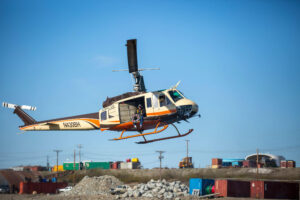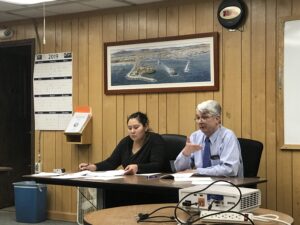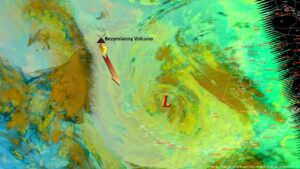Some not so good news in this latest update: Nome musher Kirsten Bey was hit by a snow machine on Sunday and has been medevac’d to Fairbanks.
That was confirmed by the Serum Run Expedition 2020 leader Robert Forto. Other expedition members have said Bey likely has a broken leg and possible concussion, but her dogs are uninjured. The incident happened Sunday night about five miles outside of Galena.
KNOM has more about the snowmachine wreck, the group’s time in Ruby and arrival into Galena, as well as some history from this part of the trail during the 1925 Serum Run.
Fellow Nome musher Stephanie Johnson had trouble holding back tears when she shared that Bey instructed Johnson to use her strong dogs to finish the trip to Nome.
“She and I have been working towards this goal since June. To not have her here, is difficult… and of course she’s thinking of me before she’s thinking of laying in a trauma bed.”
The collision was reportedly caused by a local snowmachiner who, according to Johnson, did stay and call Galena Search and Rescue.
“They got her in a sled. One of the search and rescue guys actually mushed the team back to Galena.”
As for Bey’s dogs, they will be getting some help from another Nome mushing family: Nils Hahn and Diana Haecker. Hahn had already chartered a Bering Air flight to bring his dogs to Willow for the Iditarod, from there the plane will go to Galena and bring Bey’s dog team to Nome.
Later in the afternoon on social media, the Expedition reported that Bey is recovering well. Due to the accident and strain it has made on the team, they will be staying in Galena for an additional evening.

After about 122 miles and two days of traveling on the frozen Yukon River, Expedition Leader Robert Forto says the team was glad to trade Arctic ovens for lodging once they arrived at an earlier stop at the Ruby school, where they could dry out and rest.
“The two nights on the Yukon were pretty tough on everybody just because it was so cold. Ran into some overflow but otherwise I think we’re plugging along OK.”
While exact temperatures for their camping locations are hard to know, Forto has estimated that nighttime temps have dipped to forty below zero.
Deep snow and overflow have been challenges and Forto says that river terrain is new for many of expedition members and their dog teams. The trail itself was already groomed by the Iron Dog snowmachine race, but any machiners or mushers that veered off the trail quickly found themselves in deep snow.
“Dog teams do great. They’re a heck of a lot lighter than machines. They’re a heck of a lot easier to pull out. And quite frankly, the dog sled is a heck of a lot easier to drive.”
That deep snow has been a problem for Forto on his machine. He worries that if he can’t get more parts and a chance to wrench on his machine, then he may have to drop out in Galena. He’s already broken a belt, which according to an official update on social media, will need to be fixed. Now Forto says there are bolts on the motor that need to be replaced.
And these mechanical issues can make it more difficult to stick together. While they meet up at night to camp, the group is spread out over miles. There are trailbreakers in the front, mushers and snowmachiners in the middle, and “sweeps” in the back who clean camp and check for problems from the back of the trail. But even with the use of an InReach, Forto says that distance between group members makes it hard to know when someone has an issue.
“You can only get updates every now and then. I didn’t even know that they were stuck until I got to camp and then of course we set up camp and everything. And then Phil went out and got them but he had to ride forty miles out to get them and then of course forty miles back.”
Despite the challenges, it’s a section that Nome musher Stephanie Johnson, who celebrated her birthday over the weekend, has been dreaming about for a long time.
“People are telling me I’m going to get tired of river miles but just what an amazing thing to say that you’ve been down the Yukon River by dog team.”
The group continues to show the film “Attla” in the communities and conducted another vaccine clinic in Ruby. Forto says they had a warm welcome with a community potluck and breakfast at the local school as well.
Conditions along the Yukon River were certainly no easier for the original Serum Run mushers of 1925. Gay and Laney Salisbury report in The Cruelest Miles that the stretch from Ruby to Galena was covered by Bill McCarty and then brothers George and Edgar Nollner, who took the serum to Bishop Mountain, about 18 miles past Galena. There they met with Charlie Evans, who also ran mail by dog team on a regular basis to Galena and other communities.
Evans said he hadn’t been expecting to make the run and had to borrow lead dogs to fill out his team. Ten miles down the Yukon, Evans ran into ice fog and overflow. Temperatures were in the minus 60’s. The Salisbury’s write that later Evans said, “I trusted the dogs. They trusted me. They had a sixth sense and seemed to know what I was thinking.”
And so Evans just let the dogs go. But for the lead dogs, things became too much. They began to freeze in the cold and eventually fell over. By the time Evans arrived in Nulato, two dogs had died in his sled. One report said that Evans took the harness and led the team the rest of the way to Nulato himself. Though Evans never confirmed that in later interviews, the Salisbury’s speculate it could be true. If he had to borrow lead dogs, it is likely none of the other dogs in his team were trained to lead.
Click below to hear an historical KNOM interview with original 1925 Serum Run driver, Charlie Evans of Galena:
Image at top: 11 of the original 13 that set out from Nenana to Nome on February 22nd, 2020 for the Serum Run Expedition. Photo from Davis Hovey, KNOM (2020).





